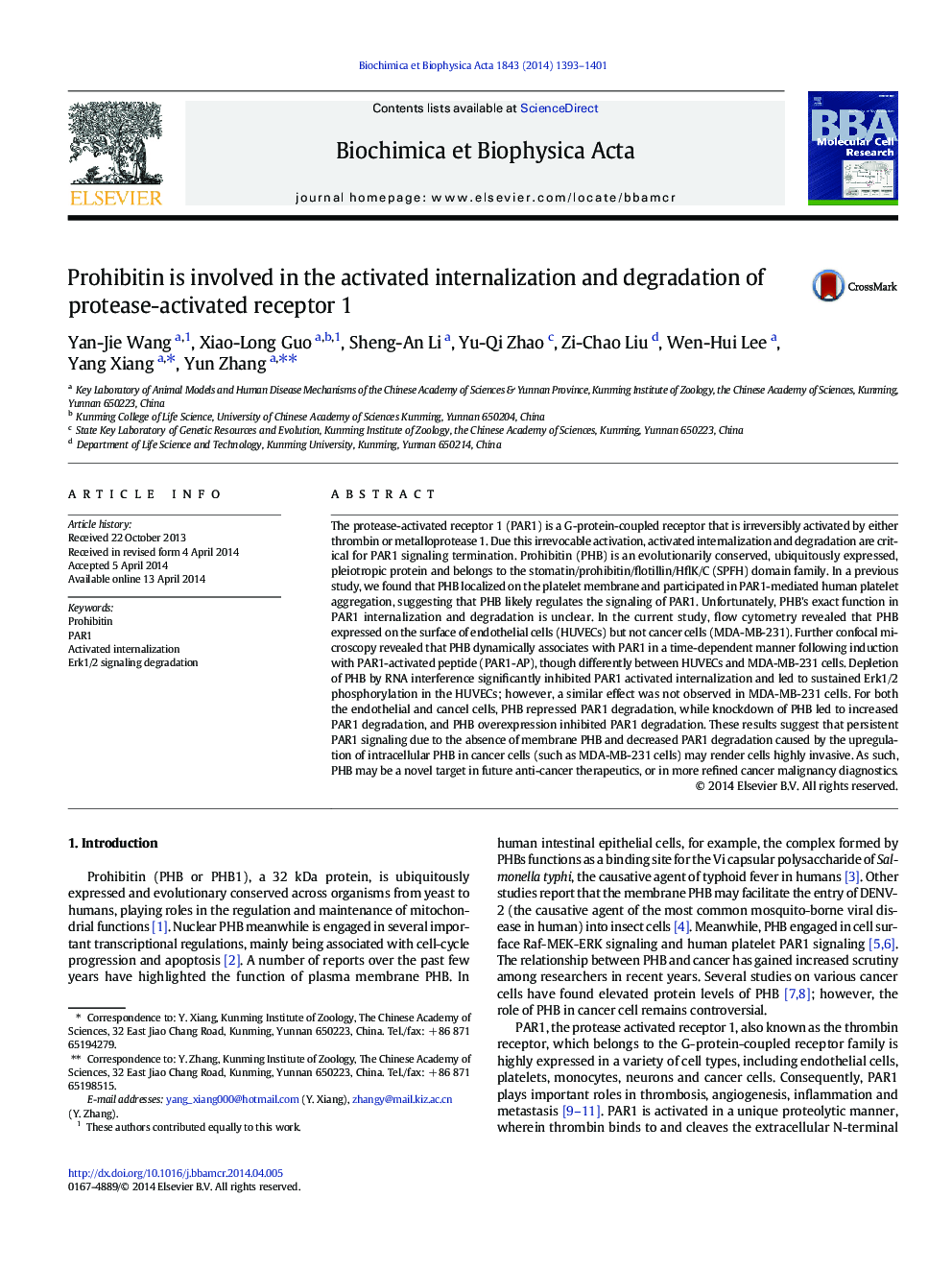| کد مقاله | کد نشریه | سال انتشار | مقاله انگلیسی | نسخه تمام متن |
|---|---|---|---|---|
| 1950584 | 1055664 | 2014 | 9 صفحه PDF | دانلود رایگان |
عنوان انگلیسی مقاله ISI
Prohibitin is involved in the activated internalization and degradation of protease-activated receptor 1
دانلود مقاله + سفارش ترجمه
دانلود مقاله ISI انگلیسی
رایگان برای ایرانیان
کلمات کلیدی
موضوعات مرتبط
علوم زیستی و بیوفناوری
بیوشیمی، ژنتیک و زیست شناسی مولکولی
زیست شیمی
پیش نمایش صفحه اول مقاله

چکیده انگلیسی
The protease-activated receptor 1 (PAR1) is a G-protein-coupled receptor that is irreversibly activated by either thrombin or metalloprotease 1. Due this irrevocable activation, activated internalization and degradation are critical for PAR1 signaling termination. Prohibitin (PHB) is an evolutionarily conserved, ubiquitously expressed, pleiotropic protein and belongs to the stomatin/prohibitin/flotillin/HflK/C (SPFH) domain family. In a previous study, we found that PHB localized on the platelet membrane and participated in PAR1-mediated human platelet aggregation, suggesting that PHB likely regulates the signaling of PAR1. Unfortunately, PHB's exact function in PAR1 internalization and degradation is unclear. In the current study, flow cytometry revealed that PHB expressed on the surface of endothelial cells (HUVECs) but not cancer cells (MDA-MB-231). Further confocal microscopy revealed that PHB dynamically associates with PAR1 in a time-dependent manner following induction with PAR1-activated peptide (PAR1-AP), though differently between HUVECs and MDA-MB-231 cells. Depletion of PHB by RNA interference significantly inhibited PAR1 activated internalization and led to sustained Erk1/2 phosphorylation in the HUVECs; however, a similar effect was not observed in MDA-MB-231 cells. For both the endothelial and cancel cells, PHB repressed PAR1 degradation, while knockdown of PHB led to increased PAR1 degradation, and PHB overexpression inhibited PAR1 degradation. These results suggest that persistent PAR1 signaling due to the absence of membrane PHB and decreased PAR1 degradation caused by the upregulation of intracellular PHB in cancer cells (such as MDA-MB-231 cells) may render cells highly invasive. As such, PHB may be a novel target in future anti-cancer therapeutics, or in more refined cancer malignancy diagnostics.
ناشر
Database: Elsevier - ScienceDirect (ساینس دایرکت)
Journal: Biochimica et Biophysica Acta (BBA) - Molecular Cell Research - Volume 1843, Issue 7, July 2014, Pages 1393-1401
Journal: Biochimica et Biophysica Acta (BBA) - Molecular Cell Research - Volume 1843, Issue 7, July 2014, Pages 1393-1401
نویسندگان
Yan-Jie Wang, Xiao-Long Guo, Sheng-An Li, Yu-Qi Zhao, Zi-Chao Liu, Wen-Hui Lee, Yang Xiang, Yun Zhang,